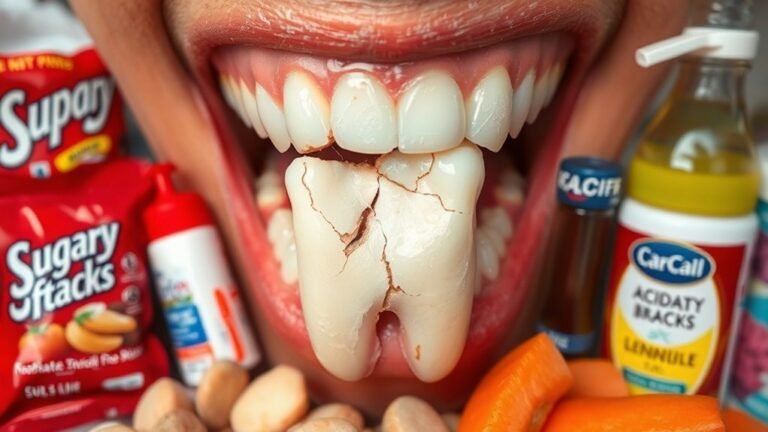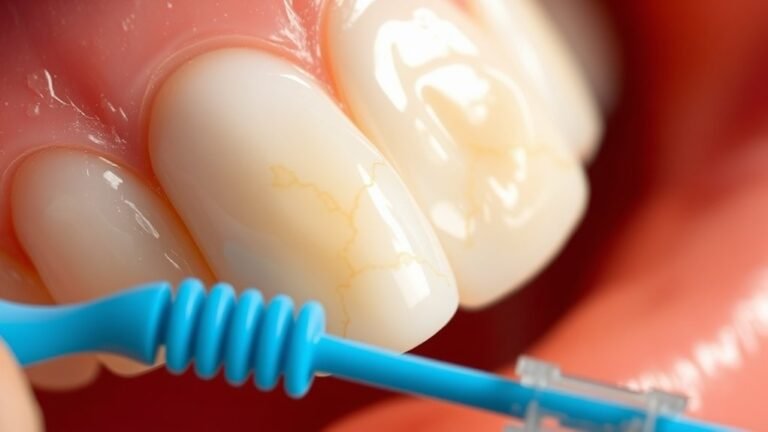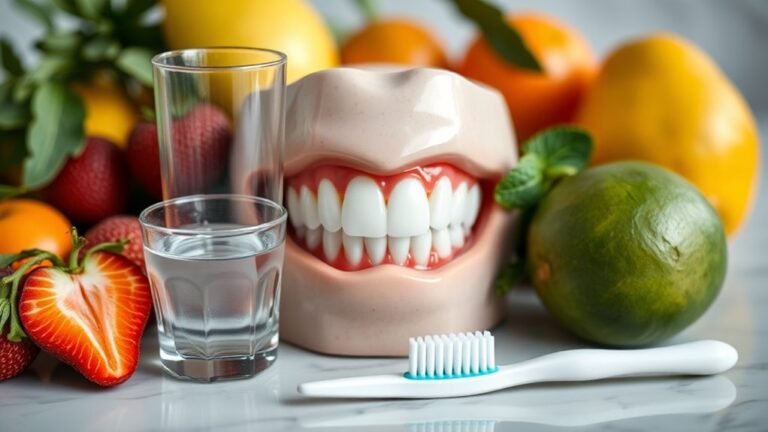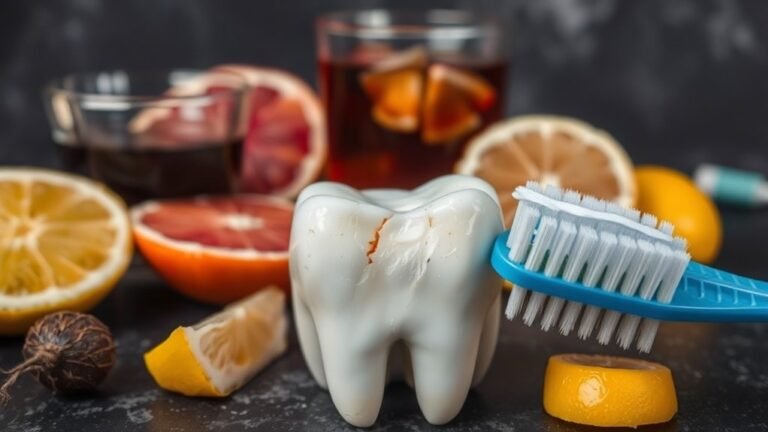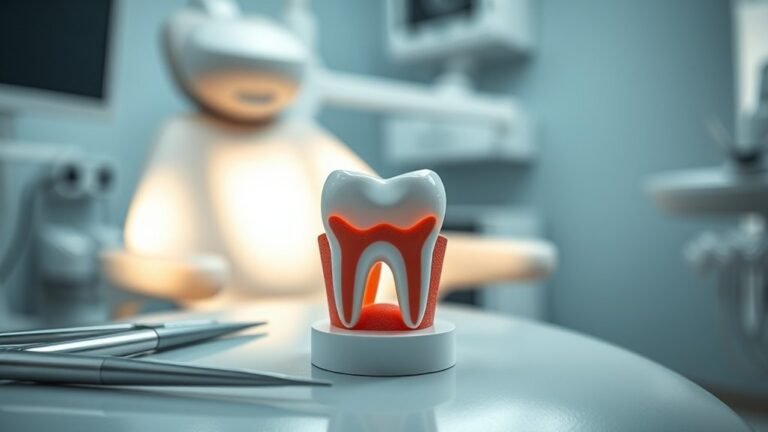Acid Erosion Harms Enamel and Causes Irreversible Tooth Sensitivity
Acid erosion greatly harms your enamel, leading to irreversible tooth sensitivity. When your enamel weakens from dietary acids found in soft drinks, citrus fruits, and other foods, you may experience discomfort with hot, cold, or sweet items. Symptoms like sharp pain and lingering sensitivity can affect your daily life. To safeguard your dental health, it’s vital to understand prevention strategies and treatment options available to counteract the effects of acid erosion on your teeth.
Key Takeaways
- Acid erosion degrades tooth enamel, leading to permanent loss and increased tooth sensitivity.
- Common causes include acidic foods, beverages, and health conditions like GERD.
- Symptoms of tooth sensitivity include pain from hot, cold, or sweet stimuli.
- Preventive measures involve limiting acidic intake and maintaining good oral hygiene practices.
- Professional treatments can help restore enamel integrity and alleviate sensitivity issues.
Understanding Acid Erosion
Acid erosion occurs when acids wear away the enamel, the protective outer layer of your teeth. This process leads to enamel damage, making your teeth more susceptible to decay and sensitivity. It’s essential to understand that acid erosion can result from dietary choices, certain beverages, and even gastric acids. Maintaining good oral hygiene can help mitigate its effects, but once enamel is lost, it cannot regenerate. This makes preventive measures vital. Regular dental check-ups and minimizing acidic foods and drinks can protect your enamel. Additionally, using fluoride toothpaste can strengthen your teeth. By being proactive about your oral hygiene and understanding the risks of acid erosion, you can preserve your enamel and maintain a healthy smile for years to come.
Common Causes of Acid Erosion
Acid erosion can arise from several common sources in your daily life. Dietary acidic foods and beverages with high acidity can weaken your tooth enamel, while conditions like gastroesophageal reflux disease (GERD) can introduce harmful acids into your mouth. Understanding these causes is vital for protecting your dental health.
Dietary Acidic Foods
Many people may not realize how common dietary acidic foods contribute to tooth erosion. Foods like citrus fruits, tomatoes, and vinegar-based dressings can wear down your enamel over time. When enamel erodes, it can lead to irreversible tooth sensitivity, making it painful to eat or drink hot, cold, or sweet items. It’s essential to be mindful of these acidic foods in your diet and how they interact with your dental health. Regular dental care can help mitigate the effects of acid erosion, but avoiding excessive consumption of these foods is equally important. Consider balancing your meals with non-acidic options and practicing good oral hygiene to protect your teeth from the damaging effects of dietary acids.
Beverages With High Acidity
Alongside dietary acidic foods, beverages can greatly contribute to acid erosion in your teeth. Many popular drinks, like sodas, citrus juices, and energy drinks, have high acidity levels that can wear down enamel. This erosion can lead to irreversible tooth sensitivity, making everyday activities like eating and drinking uncomfortable. To combat this, consider using fluoride toothpaste, which can help remineralize enamel, and potassium nitrate, which is known to reduce sensitivity. While it’s essential to enjoy these beverages in moderation, rinsing your mouth with water afterward can also help neutralize acids. By being mindful of your beverage choices, you can protect your teeth from the damaging effects of acid erosion.
Gastroesophageal Reflux Disease
When you experience frequent heartburn or regurgitation, it could be a sign of gastroesophageal reflux disease (GERD), a condition that can considerably contribute to acid erosion of your teeth. The acid from your stomach can flow back into your mouth, damaging enamel and leading to tooth sensitivity. Understanding the common causes of GERD can help you manage your symptoms and protect your dental health.
| Common Causes | Impact on GERD | Tips for Management |
|---|---|---|
| Obesity | Increases pressure on the stomach | Maintain a healthy weight |
| Smoking | Weakens the esophageal sphincter | Quit smoking |
| Certain foods | Trigger acid production | Avoid spicy, fatty foods |
| Alcohol consumption | Irritates the esophagus | Limit intake |
Taking proactive steps can safeguard both your digestive and dental health.
The Impact of Acid Erosion on Enamel
Acid erosion greatly weakens your tooth enamel, making it more susceptible to damage. As the protective layer erodes, you may experience increased tooth sensitivity to hot, cold, or sweet stimuli. Understanding the causes and effects of acid erosion is essential for maintaining your dental health.
Causes of Acid Erosion
Many factors contribute to acid erosion, greatly impacting the enamel that protects your teeth. Understanding these causes can help you take preventive measures. Here are some common contributors to acid erosion:
- Diet: Consuming acidic foods and beverages like citrus fruits, sodas, and wine increases enamel wear.
- Acid Reflux: Stomach acids can flow back into your mouth, leading to enamel erosion over time.
- Brushing Technique: Aggressive brushing can wear down enamel, especially when combined with acidic exposure.
- Dry Mouth: A lack of saliva reduces your mouth’s ability to neutralize acids, accelerating erosion.
Effects on Tooth Sensitivity
As enamel erodes due to various factors, you may experience increased tooth sensitivity. This heightened sensitivity occurs because the protective layer of enamel thins, exposing the underlying dentin, which contains nerve endings. When dentin is exposed, stimuli like hot, cold, or sweet foods can trigger discomfort or pain. You might find everyday activities, such as drinking your morning coffee or enjoying ice cream, become challenging. Furthermore, acid erosion can lead to more severe dental issues if left untreated, including cavities and additional enamel loss. It’s essential to address these changes early by visiting your dentist and adopting preventive measures. By understanding the effects of acid erosion, you can take steps to protect your teeth and maintain your oral health.
Symptoms of Tooth Sensitivity
When you experience tooth sensitivity, it often manifests as a sharp or sudden pain in response to specific stimuli, such as hot, cold, sweet, or acidic foods and drinks. This discomfort can be fleeting but may greatly impact your daily life. Recognizing the symptoms is vital for addressing the issue effectively. Here are some common indicators:
- Pain when consuming hot or cold items
- Sensitivity when biting into sweet or acidic foods
- Discomfort during oral hygiene routines, like brushing or flossing
- Pain that lingers after exposure to triggers
If you notice these symptoms, it’s essential to consult a dental professional for evaluation and appropriate treatment options to manage your tooth sensitivity.
Long-Term Effects of Acid Erosion on Oral Health
Although acid erosion may seem like a minor concern initially, its long-term effects on oral health can be significant and detrimental. As enamel wears away, you may experience increased tooth sensitivity, making eating and drinking uncomfortable. Over time, weakened enamel can lead to cavities, as the protective barrier diminishes and bacteria invade the tooth structure. You might also notice changes in your smile due to discoloration or uneven wear, which can affect your self-esteem. In addition, prolonged acid exposure could contribute to gum recession, increasing the risk of periodontal disease. These cumulative effects highlight the importance of recognizing and addressing acid erosion early to maintain your oral health and prevent more severe complications in the future.
Prevention and Treatment Options
To effectively prevent and treat acid erosion, you should adopt a multifaceted approach that includes dietary changes, proper oral hygiene, and professional dental care. Here are some key strategies to contemplate:
Adopting a comprehensive strategy of dietary changes, oral hygiene, and dental care is essential for preventing and treating acid erosion.
- Limit acidic foods and drinks, like citrus fruits and soda.
- Rinse your mouth with water after consuming acidic substances to neutralize acids.
- Use a soft-bristled toothbrush and fluoride toothpaste to protect enamel.
- Schedule regular dental check-ups for early detection and treatment.
Frequently Asked Questions
Can Acid Erosion Affect Dental Restorations Like Fillings or Crowns?
Yes, acid erosion can affect dental restorations like fillings or crowns. It may weaken the bond between the restoration and tooth structure, leading to potential failures or the need for replacements. Regular check-ups are essential.
Is There a Specific Age Group More Prone to Acid Erosion?
“You’re only as old as you feel.” Generally, teens and young adults are more susceptible to acid erosion due to dietary choices and lifestyle habits, but anyone can be affected at any age without proper care.
Does Diet Play a Role in the Recovery From Acid Erosion?
Yes, your diet considerably impacts recovery from acid erosion. Consuming calcium-rich foods, limiting acidic and sugary items, and staying hydrated can help strengthen enamel and support the healing process for your teeth.
Can Certain Medications Contribute to Increased Acid Erosion Risk?
Medications can definitely magnify your mouth’s acidity, increasing acid erosion risk. Certain drugs, especially those reducing saliva flow or containing acids, can contribute. Always consult your dentist before starting any new medication to protect your enamel.
How Does Acid Erosion Differ From Regular Tooth Decay?
Acid erosion directly wears away enamel due to acidic exposure, while regular tooth decay results from bacteria producing acids after consuming sugars. Both harm teeth, but their causes and processes differ markedly.
Conclusion
In the battle against acid erosion, your enamel stands as a fragile fortress, slowly worn down by the acid storms of daily life. To protect this crucial shield, embrace preventive measures and seek treatment at the first sign of sensitivity. By nurturing your oral health, you can preserve the strength and beauty of your smile, ensuring that your teeth shine brightly like polished gems. Remember, a proactive approach today safeguards your dental future tomorrow.

